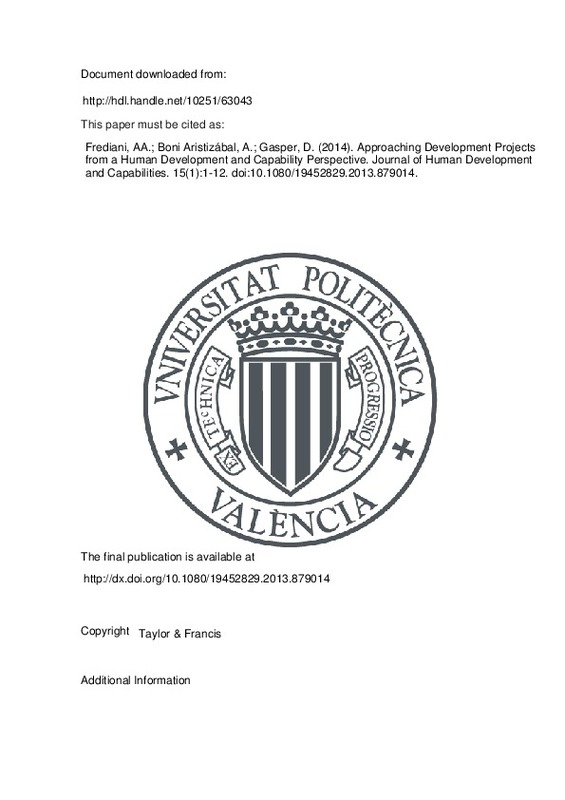Alkire, S. (2002). Valuing Freedoms. doi:10.1093/0199245797.001.0001
Barnett, J. (2011). Human Security. Oxford Handbooks Online. doi:10.1093/oxfordhb/9780199566600.003.0018
Biggeri, M., Ballet, J., & Comim, F. (Eds.). (2011). Children and the Capability Approach. doi:10.1057/9780230308374
[+]
Alkire, S. (2002). Valuing Freedoms. doi:10.1093/0199245797.001.0001
Barnett, J. (2011). Human Security. Oxford Handbooks Online. doi:10.1093/oxfordhb/9780199566600.003.0018
Biggeri, M., Ballet, J., & Comim, F. (Eds.). (2011). Children and the Capability Approach. doi:10.1057/9780230308374
Biggeri, M., & Ferrannini, A. (2014). Opportunity Gap Analysis: Procedures and Methods for Applying the Capability Approach in Development Initiatives. Journal of Human Development and Capabilities, 15(1), 60-78. doi:10.1080/19452829.2013.837036
Crocker, D. A. (2008). Ethics of Global Development. doi:10.1017/cbo9780511492594
Cruz, I., Stahel, A., & Max-Neef, M. (2009). Towards a systemic development approach: Building on the Human-Scale Development paradigm. Ecological Economics, 68(7), 2021-2030. doi:10.1016/j.ecolecon.2009.02.004
Drèze, J., & Sen, A. (2002). India. doi:10.1093/acprof:oso/9780199257492.001.0001
Fernández-Baldor, Á., Boni, A., Lillo, P., & Hueso, A. (2013). Are technological projects reducing social inequalities and improving people’s well-being? A capability approach analysis of renewable energy-based electrification projects in Cajamarca, Peru. Journal of Human Development and Capabilities, 15(1), 13-27. doi:10.1080/19452829.2013.837035
Frediani, A. A. (2007). Amartya Sen, the World Bank, and the Redress of Urban Poverty: A Brazilian Case Study. Journal of Human Development, 8(1), 133-152. doi:10.1080/14649880601101473
Frediani, A. A. (2010). Sen’s Capability Approach as a framework to the practice of development. Development in Practice, 20(2), 173-187. doi:10.1080/09614520903564181
Gasper, D. (2002). Is Sen’s Capability Approach an Adequate Basis for Considering Human Development? Review of Political Economy, 14(4), 435-461. doi:10.1080/0953825022000009898
Gasper, D. (2007). What is the capability approach? The Journal of Socio-Economics, 36(3), 335-359. doi:10.1016/j.socec.2006.12.001
GASPER, D. (2009). FROM VALUED FREEDOMS, TO POLITIES AND MARKETS THE CAPABILITY APPROACH IN POLICY PRACTICE. Revue Tiers Monde, 198(2), 285. doi:10.3917/rtm.198.0285
Guillen-Royo, M. (2010). Realising the ‘wellbeing dividend’: An exploratory study using the Human Scale Development approach. Ecological Economics, 70(2), 384-393. doi:10.1016/j.ecolecon.2010.09.010
Holland, J. (Ed.). (2013). Who Counts? doi:10.3362/9781780447711
Kleine, D. (2013). Technologies of Choice? doi:10.7551/mitpress/9061.001.0001
Moser, C. (2012). Gender Planning and Development. doi:10.4324/9780203411940
Mowles, C., Stacey, R., & Griffin, D. (2008). What contribution can insights from the complexity sciences make to the theory and practice of development management? Journal of International Development, 20(6), 804-820. doi:10.1002/jid.1497
Muñiz Castillo, M. R. (2014). Development Projects from the Inside Out: Project Logic, Organizational Practices and Human Autonomy. Journal of Human Development and Capabilities, 15(1), 79-98. doi:10.1080/19452829.2013.837034
Nussbaum, M. C. (2001). Upheavals of Thought. doi:10.1017/cbo9780511840715
Nussbaum, M. C. (2011). Creating Capabilities. doi:10.4159/harvard.9780674061200
Oosterlaken, I., & van den Hoven, J. (Eds.). (2012). The Capability Approach, Technology and Design. Philosophy of Engineering and Technology. doi:10.1007/978-94-007-3879-9
Pick, S., & Sirkin, J. (2010). Breaking the Poverty Cycle: The Human Basis for Sustainable Development. doi:10.1093/acprof:oso/9780195383164.001.0001
Robeyns, I. (2005). The Capability Approach: a theoretical survey. Journal of Human Development, 6(1), 93-117. doi:10.1080/146498805200034266
Schischka, J., Dalziel, P., & Saunders, C. (2008). Applying Sen’s Capability Approach to Poverty Alleviation Programs: Two Case Studies. Journal of Human Development, 9(2), 229-246. doi:10.1080/14649880802078777
Trani, J.-F., Bakhshi, P., Bellanca, N., Biggeri, M., & Marchetta, F. (2011). Disabilities through the Capability Approach lens: Implications for public policies. Alter, 5(3), 143-157. doi:10.1016/j.alter.2011.04.001
Walker, J., Frediani, A. A., & Trani, J.-F. (2012). Gender, difference and urban change: implications for the promotion of well-being? Environment and Urbanization, 25(1), 111-124. doi:10.1177/0956247812468996
[-]







![[Cerrado]](/themes/UPV/images/candado.png)


